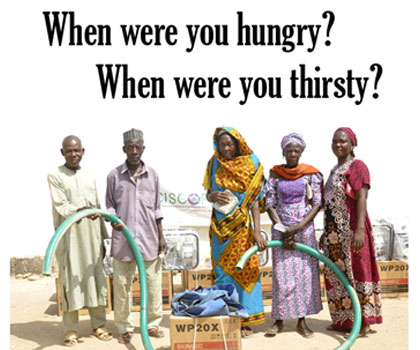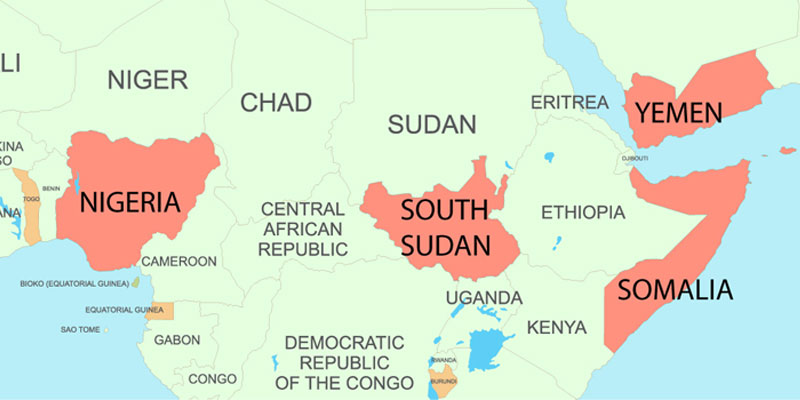
Give Now – Alleviate Extreme Hunger and Famine
Famine and extreme hunger are a reality today for many of our siblings. Matthew 25 challenges us to respond as if Christ were hungry. The Presbyterian Hunger Program has partners working in places where people are suffering, and the need is immense. We want to do more, so we ask for your help and for your church’s help. Resources are available to help you share the need with your congregation.
Background and Response
There is enough food in the world for everyone. But because of poor access and distribution, extreme weather and political instability, many don’t have enough to survive. Even with all the progress the world has made in the past decades, people are still suffering from hunger in the four countries where famine was declared in 2017: Somalia, Yemen, South Sudan, and Nigeria.
An official declaration of famine means that at least 20% of households face an extreme lack of food, and large numbers of people are dying every day due to hunger. In many other places where famine hasn’t been declared, many families and communities still suffer from extreme hunger. These places include Haiti, Democratic Republic of Congo, Niger, Cameroon, Central African Republic and Chad. Conflicts, war, natural disasters and climate change are often the causes.
The Presbyterian Church (U.S.A.), through the Presbyterian Hunger Program, supports partners around the world who are working in their communities to identify why people are hungry and to implement long-term solutions. In the fall of 2018, the PHP Advisory Committee voted to begin supporting the work of a partner in each of the four countries where famine had been most recently declared.
- Our partner in Somalia is Kaalmo Relief and Development. Kaalmo is an organization with experience supporting the development and advocacy needs of poor and at-risk communities, as well assisting those impacted by conflict, drought and historic flooding. The PC(USA) has supported emergency food distribution and restoration of agricultural and pastoral production systems.
- In Yemen, war has left more than 8.4 million people at risk of starvation. The response of our partner, Generations Without Qat, has included the distribution of fishing kits, goats to provide milk, support for income generating activities, and skills or capacity building trainings.
- In South Sudan, flooding and civil war have contributed to food insecurity, which has led to an increase in gender-based violence. Many have been left without enough to eat or a safe place to call home. Our partner, Hope Restoration South Sudan, has helped establish demonstration farms and provided seeds, tools and training for women and girls. Thousands of men and women have participated in training on gender-based violence awareness, and women survivors of gender-based violence have received case management support.
- In northeast Nigeria, the violence of Boko Haram has caused death, destruction and the displacement of millions of people. Flooding has added to the heavy toll, displacing dozens of villages. Our partner Civil Society for Poverty Eradication (CISCOPE) has provided support for families returning home to places where their homes and farms had been burned, and for host communities whose resources were stretched thin when shared with so many who were displaced. Farmers groups were formed and gave advice on what inputs would be most helpful in their communities, and the response has included the provision of training, seeds, tree seedlings, water pumps, agricultural processing equipment, and support for community-based Group Savings and Loans Associations.

The need is immense, and we want to continue this work.
Our partners in these countries – and around the world – are working to address the underlying causes of hunger, and when necessary, to also respond with emergency assistance. The Presbyterian Hunger Program continues to support this work, and we invite you to join us, so that fewer families will be hungry and malnourished.
Resources
- Bulletin insert famine and extreme hunger
- Video – PHP Responds to Extreme Hunger and Famine
- Famine Fact Sheet – learn about the drivers and realities of famine
- Fact Sheet on the Four Famines – Somalia, Yemen, South Sudan, Nigeria
- Poster “When were you hungry?”
Download the 2 minute video to share with your congregation.
Take Action
- Urge Congress to end U.S. military participation in Yemen.
- Contact your U.S. Representative at 202-225-3121 and your Senators at 202-224-3121. Let them know you oppose further cuts to the International Affairs Budget, so that the U.S. can continue to respond to famine and other global hunger crises.
- Urge your members of congress to support refugee resettlement.
Stories about partners responding to famine
- Your Gifts to PHP at work in Nigeria – update on the work of PHP partner CISCOPE (April 2021)
- Warning Signs of Famine on Horizon for Somalia (July 2019)
- Restoring Hope to Famine Stricken South Sudan: PHP partners with Hope Restoration South Sudan to improve food security and empower women and girls through farming, by Eileen Schuhmann
- Presbyterian Disaster Assistance joins the Presbyterian Hunger Program to respond to famine and poverty in Yemen, by Rich Copley
